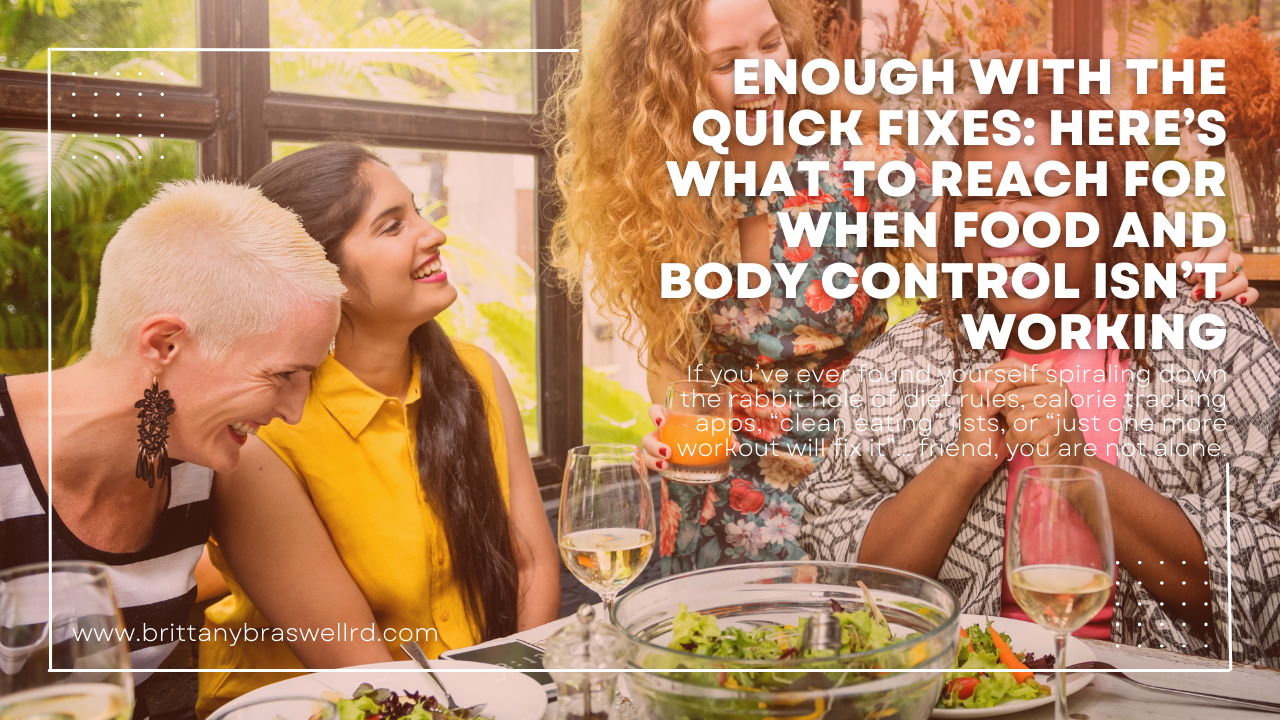Food Freedom Isn’t “For Later” — 5 Excuses Christian Women Use (and How to Break Free Today)

Food Freedom Isn’t “For Later” — 5 Excuses Christian Women Use (and How to Break Free Today)
Whew — we’re going there today, friend.
If you’ve ever thought…
“I want food freedom… I really do… BUT ____.”
…then pull up a cozy chair, grab your chai, and let’s chat. Because you are not the only Christian woman who loves Jesus AND still finds herself wrestling with food guilt, body stress, and the sneaky voice saying you “should” have this figured out by now.
And hey — I get it. I’ve heard all the fears, excuses, and “not yets” over the years (and honestly? I’ve believed half of them myself at some point).
But those fears?
Those excuses?
Those sneaky thoughts that sound logical?
They're often the very things standing between you and the joy-filled, peace-drenched food freedom Jesus desires for you. 🕊️
So today, we’re breaking down the Top 5 Excuses Christian women believe about pursuing food freedom — and replacing them with Scripture, clarity, and encouragement that empowers you ...
Why Intuitive Eating Hasn’t Worked (and the 3 Keys to Food Freedom That Lasts)

Why Intuitive Eating Hasn’t Worked (and the 3 Keys to Food Freedom That Lasts)
Have you ever tried to assemble a piece of IKEA furniture without looking at the instructions? 🙋♀️ (Yep… guilty over here.) At first, it feels freeing. Like, “I’ve got this! I’ve done something similar before. No big deal.”
But then… you realize you’re missing a peg. The back panel is on upside down. And suddenly, what was supposed to be a cute bookshelf is wobbly, crooked, and one sneeze away from collapsing. Oy vey!
That’s exactly how so many women try to approach intuitive eating.
You hear about it. You’re intrigued. You decide to toss out all the diet rules and just “eat what sounds good.” But before long, things feel wobbly. You’re confused, frustrated, maybe even convinced something must be wrong with you.
Friend, hear me on this: If intuitive eating hasn’t worked for you, it’s not because you failed. It’s because you were missing pieces of the foundation.
And today, I want to walk you throug...
Breaking Free from Binge Eating: Christ-Centered Recovery for Women of Faith

Ever feel like you’re the exception? 🙋♀️ Like, sure, other women can heal their relationship with food, but you? Nah. You’ve tried the therapy, the devotionals, the diets, the accountability groups, the affirmations… and still find yourself knee-deep in a pint of ice cream wondering if food freedom is even possible for you.
Friend, let me assure you right now: you are not the exception.
This lie is one of the enemy’s favorite tricks. If he can get you to believe that recovery isn’t possible for you, he keeps you stuck in shame, isolation, and a never-ending cycle of striving.
But here’s the truth: God’s freedom is for you, too. And in this post, I’m going to walk you through how to recover from binge eating as a Christian woman with practical tools, relatable stories, and most importantly—a Christ-centered lens.
Why Christian Women Struggle with Binge Eating
Let’s be real—binge eating is complicated. It’s not just about “loving food too much” (eye roll 🙄). For many women I wor...
Control Feels Safe, But It’s Not Peace: Finding True Food Freedom in Christ

We need to have a little heart-to-heart, friend. Because if there’s one struggle I see over and over again in the women I work with, it’s this: clinging to control with food and body feels safe, but it’s not peace. And it’s definitely not freedom.
If you’ve ever thought, “If I could just control what I eat better… if I could just stick to my food rules… if I could just control my body shape or size, THEN I’d finally feel at peace” — this post is for you.
Peace and control are not the same thing. In fact, they’re polar opposites. And I’m going to show you why today — with a little tough love, a lot of grace, and some Jesus-centered encouragement along the way. ❤️
Why Control Feels Like Safety (But Isn’t)
Let’s be real for a sec. Control feels safe. It feels predictable. It feels like we’re putting ourselves in the driver’s seat, keeping the chaos of life neatly packed into a box (or a color-coded planner 🙋♀️).
But here’s the deal: control is a counterfeit version of peace.
Thi...
Enough with the Quick Fixes: Here’s What to Reach for When Food and Body Control Isn’t Working

Enough with the Quick Fixes: Here’s What to Reach for When Food and Body Control Isn’t Working
If you’ve ever found yourself spiraling down the rabbit hole of diet rules, calorie tracking apps, “clean eating” lists, or “just one more workout will fix it”… 🙋♀️ friend, you are not alone.
But can we just be honest for a second? Quick fixes don’t fix much of anything. Sure, they might feel like they’re working for a hot second. But eventually—whether it’s two weeks or two years down the road—you find yourself back in the same cycle of restriction, control, frustration, and wondering if food will ever not feel like the boss of you.
That’s why today we’re talking about what to actually reach for when food and body control isn’t working (because honestly, it never really does).
This message is rooted in a powerful lesson from Exodus about God’s daily provision of manna and water for the Israelites—a story that has so much to say about our tendency to chase control instead of trust. An...
Can I Really Trust My Hunger Cues? 3 Sneaky Lies Christian Women Believe About Hunger (and the Truth That Sets You Free)

Can I Really Trust My Hunger Cues?
3 Sneaky Lies Christian Women Believe About Hunger (and the Truth That Sets You Free)
Ever found yourself hovering in front of the pantry at 9:30 p.m. asking: “Am I actually hungry, or just bored? Emotional? Broken?”
If you’ve ever questioned your body’s hunger cues—or even thought, “If I listened to my hunger, I’d totally lose control and eat ALL the things”—we get that around here.
For Christian women navigating a disordered or anxious relationship with food, this kind of confusion isn’t just common... it’s practically expected in a culture that glorifies diets and demonizes carbs.
But here’s the truth bomb I want to lovingly drop in your lap today:
Your hunger cues are not broken.
Your body is not the enemy.
You can learn to trust your God-designed hunger again.
So, let’s talk about it. In this post (based on a recent episode of the Faith-Filled Food Freedom podcast), we’re going to unpack:
- Why hunger feels so confusing after years of...
How to Talk to Your Husband About Body Image (Without Feeling Awkward or Ashamed)

How to Talk to Your Husband About Body Image (Without Feeling Awkward or Ashamed)
Because if you’ve ever silently panicked mid-snuggle, wondering if he’s thinking what you’re thinking about your body… this one’s for you, sister.
Let’s be real: Talking about body image with your husband feels… a little like standing in front of the church congregation in your swimsuit. 😬
It’s vulnerable. It’s uncomfortable. And it’s super tempting to just avoid the topic altogether.
But here’s the deal: Hiding your body image struggles from your spouse won’t protect your marriage—it might just create more distance.
And that’s the exact opposite of what you want, right?
So today, we’re getting into the nitty-gritty of how to actually talk to your husband about your body image—without spiraling into shame or putting up emotional walls.
Spoiler alert: You don’t have to have the perfect words. You just need an open heart and a whole lotta grace.
Let’s dive in.
Why Talking About Body Image With Your...
How to Start Seeing Your Body as Good When It Doesn’t Feel That Way with Jennifer Taylor Wagner

How much weight do you carry?...
I’m not asking about the number on your digital scale, but about the burden you carry because you never think your body is good enough.
Today, I’m sharing the mic with my friend and fellow-podcaster, Jennifer Taylor Wagner, to help you answer the question: “how do I see my body as good, even when it doesn’t feel that way?” Jennifer shares:
- 🪞Her own body image battle that began in Kindergarten and bled into her adulthood
- 🔨 Tips to break the scale’s power over you
- 👟 How you can begin the journey of body-trust when your body doesn’t seem trustworthy
- ☺️ What it means for your body to be GOOD, and you can see it as such—just the way it is, right now.
Jennifer’s Story
Growing up, Jennifer’s body was bigger than most of the bodies around her. As a result, she was mocked and bullied from Kindergarten onward. The negative comments she received scarred her and eventually became part of her identity. She began to define herself as broken, not OK, u...



